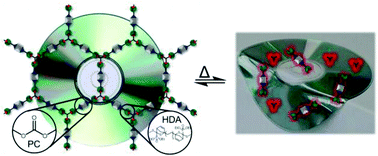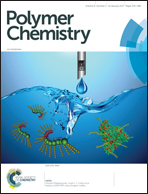Self-reporting dynamic covalent polycarbonate networks†
Abstract
Here, we report the first-time development of polycarbonate networks with self-reporting thermoreversible bonding/debonding on demand properties. The reversible linkages within the network are based on a Hetero–Diels–Alder (HDA) moiety, which is able to undergo cleavage and rebonding as a function of temperature within minutes. As HDA pair a phosphoryl dithioester and a cyclopentadiene moiety are employed as bonding and debonding take place in the temperature range between 25–120 °C. The degradation and rebonding can be readily traced by visible inspection due to the self-reporting nature of the HDA moiety. In order to prove the reversibility, linear polycarbonates (Mw = 4.200–20.000 g mol−1) including the reversible linkage in each repeating unit were generated and carefully analyzed using size exclusion chromatography (SEC), UV/Vis analysis and high temperature 1H NMR spectroscopy. Subsequently, polycarbonate networks bearing HDA units – allowing the networks to be fully degraded into small molecules – were synthesized, debonded and bonded several times in the temperature range between 25 and 120 °C within minutes. The present study thus introduces fully degradable polycarbonate networks based on a facile chemical concept as a viable alternative to networks based on C–C bond formation that disallow a complete degradation.


 Please wait while we load your content...
Please wait while we load your content...